Social climber of the year
Holly Cairns is the first sitting agriculture spokesperson to assume the leadership of a political party with Dail representation in the State’s history.
It’s even more extraordinary when you consider that she made that leap in a left-of-centre party, whose support is mostly urban. But then Cairns has been bucking tends since she scraped on to Cork County Council in 2019.
Standing for the Social Democrats in the Bantry/west Cork region, she prevailed by one vote after a number of recounts.
Little more than six months later, she had taken Fine Gael’s seat in west Cork, the original Michael Collins home constituency.
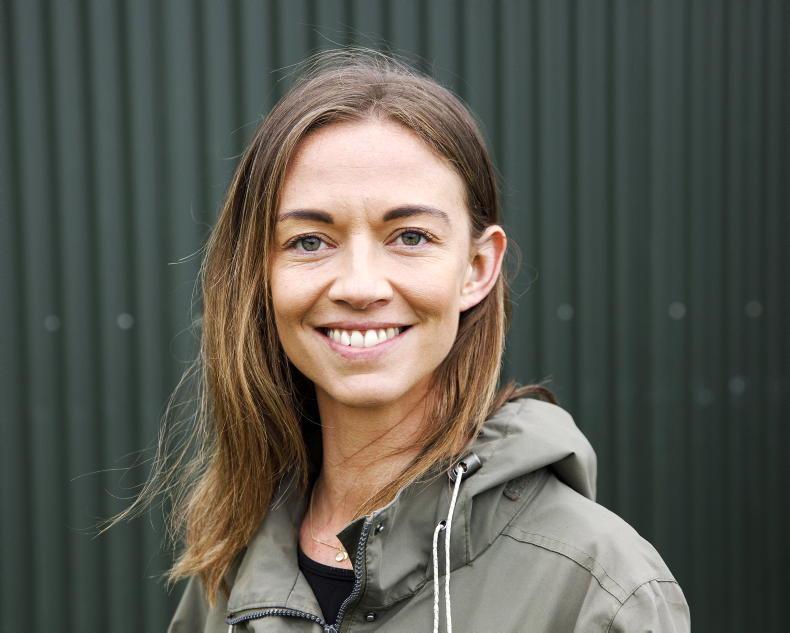
Holly Cairns. / Donal O'Leary
The scale of that achievement was a little lost in the Sinn Féin tidal wave of the January 2020 election. Since then, she has proven an articulate parliamentarian and able media performer.
While many farmers would put her in the 'woke' bracket, she is well able to argue her point on agricultural policy issues. She might claim her predictions on how the nitrates derogation changes would end have come to pass.
Now, as party leader, her challenge is to ensure the Social Democrats build on their current half-dozen TDs.
With Labour losing a number of their sitting TDs next time out, there is space on the spectrum for a centre-left party. Interestingly, Cairns has chosen to retain her agriculture portfolio as leader.
For all this, Holly Cairns is my politician of 2023.
Spring rising, winterfall
Caroline Van Der Plas catapulted into the national consciousness in March when she led a new and obscure party to first place in the Dutch regional elections. The Farmer Citizen Party (the BBB) gained almost 20% of votes, winning 137 seats on councils across the Netherlands.
They also became the largest party in the Dutch upper house - the senate - in May, as local councillors vote for senators.
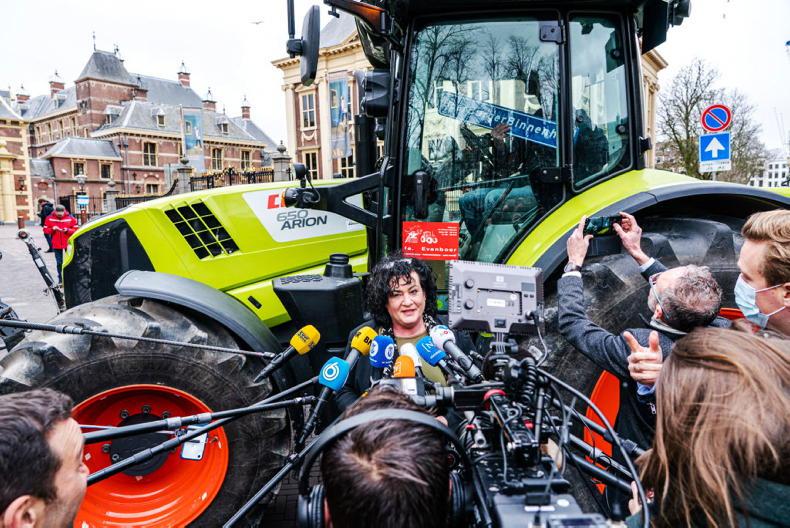
Caroline Van Der Plas of BoerBurgerBeweging (BBB). \ Jeroen Meuwsen/BSR Agency/Getty Images)
Ireland was interested partly because she is half-Irish, but also because her party's success was interpreted as a rural - and partly urban - backlash against environmental restrictions on farming, planning and industry.
The Farmers Alliance, which hopes to repeat her success in Ireland, secured her as a guest speaker (online) for its first meeting.
The BBB fared less well in last month's Dutch general elections, finishing in sixth place, with less than 5% of votes, a four-fold drop from just eight months previously.
Van der Plas, a former agri journalist, may still find herself in government as part of a four-way right of centre coalition. Next year's European elections will be another opportunity for her.
A difficult year for Donegal diplomacy
The best news Minister for Agriculture Charlie McConalogue received in 2023 was that Donegal will remain a five-seat constituency for the next general election.
The general feeling was that while McConalogue might be under pressure to retain his seat, he would have a much steeper Mount Errigal to climb if Donegal had reverted to two three-seat constituencies.

Charlie McConalogue being confronted by the IFA's leaders. \ Philip Doyle
That apart, it's been the most challenging year of McConalogue's tenure. As farming suffered from weather-related issues, farmers were angered by climate-related issues.
Nitrates derogation issues dominated the agenda for the latter half of the year, following on from a running battle over rewetting and nature restoration for the first six months.
McConalogue's ratings are currently lower than in 2021, when he had to deliver a complex and divisive CAP reform package.
Payment delays - as the Department struggled to adapt to the new CAP, with its complex network of BISS, CRISS and eco-scheme payments - led to the IFA boycotting the charter steering group.
And to round it all off, the failure to provide more than 4,000 extra places for ACRES leaves agri planners and farmers frustrated and accusing the Government of failing to live up to its rhetoric around environmental enhancement.
Outside health and housing, agriculture may have become the most difficult seat around the cabinet table.
All talk, little delivery
Eamon Ryan is well able to talk a good game. His visit to the ICMSA AGM saw him exchange views with farmers, impressing with his sincerity if not his view of dairy farming's options.
However, we have to measure a minister on what he does, not what he says. And what Eamon Ryan has done is talked about anaerobic digestion, talked about alternative land uses, talked about new income streams for farmers from those land uses. Always optimistic, always preaching about possibilities and potential.
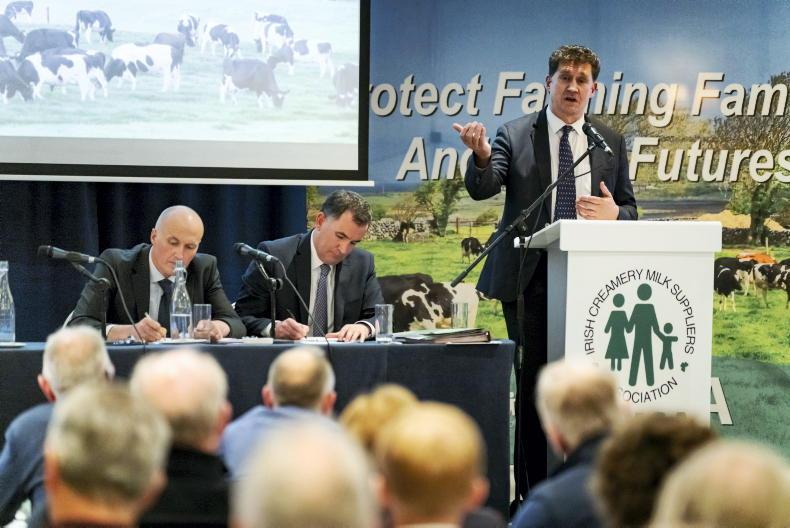
Minister Eamon Ryan at the ICMSA AGM. \ Don Moloney
But we still have no LULUCF target, never mind a plan for achieving that target. We still have no blueprint for how AD pipe dreams will be brought to reality. Moves towards creating carbon trading are farmer-led, not Government-initiated.
It's time for action, Eamon. Or get off the lettuce-growing windowbox, to give a south Dublin twist to a country saying.
Heydon hidden, can Hackett hack it?
Ministers of State have very different portfolios and have had quite different years. Martin Heydon has a much lower profile than his super-junior ministerial colleague Pippa Hackett and that has actually worked in his favour this year.
Heydon has been shielded from the worst of farmer anger by his lower profile. He will be hopeful that this teflon effect can last through until after the next election.
With only three seats up for grabs (Ceann Comhairle Sean O' Fearghail will be automatically returned) he needs all the help he can get.
Meanwhile, Hackett will know her route into the Dail got harder following the separation of Laois-Offaly into two three-seat constituencies.
Having finished sixth in the five-seat constituency last time, her higher profile following her appointment to the Seanad - and from there to cabinet - would have been a cause for cautious optimism.
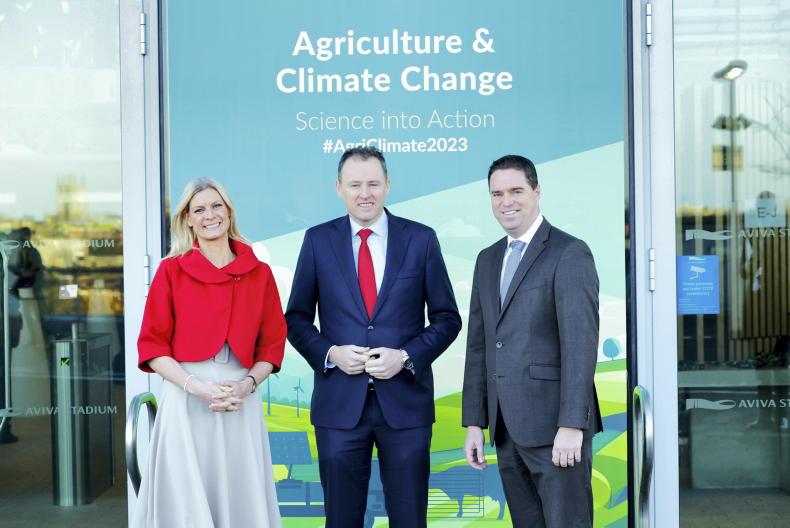
Ministers of State Pippa Hackett and Martin Heydon flank Minister for Agriculture Charlie McConalogue. \ MAXWELLS
In terms of the year gone by, Hackett can point to the success of the organic scheme she oversees. Two years ago, there were calls for unused organic scheme funds to be diverted to a suckler payment for all farmers. Now, the scheme seems certain to be oversubscribed.
In contrast, forestry remains a bit of a disaster. The problems she has were inherited, but the buck to stops with her to increase planting from current miserably low levels.
Enough to be going on with without getting dragged into calls for bans on all pesticides in the medium future, you might think, but as a conviction politician, she won't shirk from that kind of pronouncement.
It could cost her, and then again, it might pick up urban and younger voters. We'll probably find out later this year.
Yet to blossom
Claire Kerrane TD was appointed Sinn Féin's agriculture spokesperson back in April. It's fair to say that she has yet to really make her mark. While everything she has said and done has been competent and sensible, there has been opportunity for much, much more.
Kerrane is the opposition spokesperson representing by far the largest party on the opposition benches, which sees itself as the government in waiting.
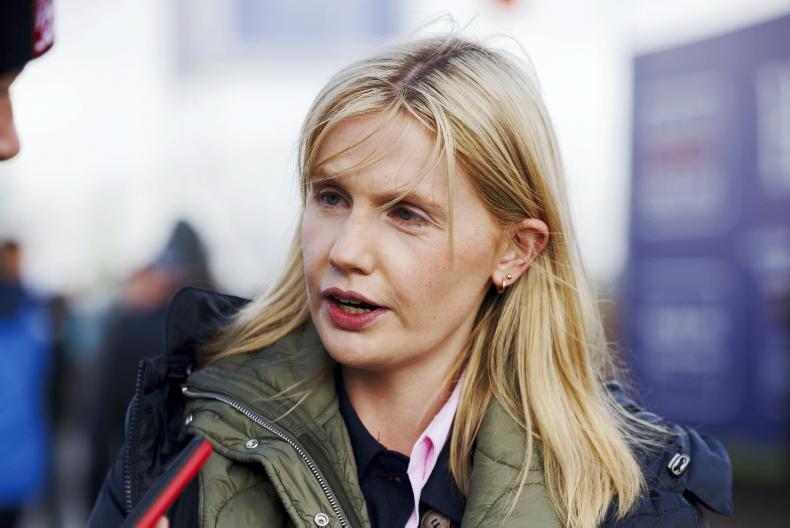
Claire Kerrane, Sinn Fein spokesperson on Agriculture. \ Donal O'Leary
However, she has not been front and centre of the many burning issues that have presented themselves since she took office.
At the National Ploughing Championships, she seemed to play second fiddle to her predecessor Matt Carthy and her party leader Mary Lou McDonald. Due to a family bereavement, she missed the TV opportunity offered by her party's Ard Fheis.
That is likely to change this year. In advance of local, European and probably national elections, Sinn Féin will want to ratchet the pressure up on the Government parties and farming and related rural issues offer opportunities.
At only 31, Kerrane is one of the new generation of Sinn Féin politicians who will be crucial to taking the next steps towards government.
The likely lads
Colm Markey and Tim Lombard face a defining year in their political careers.
Having been catapulted from Louth County Council into the European Parliament following Mairead McGuinness's selection to be Ireland's European Commissioner, Markey will put himself before the electorate in the Midlands, North and West constituency in June.
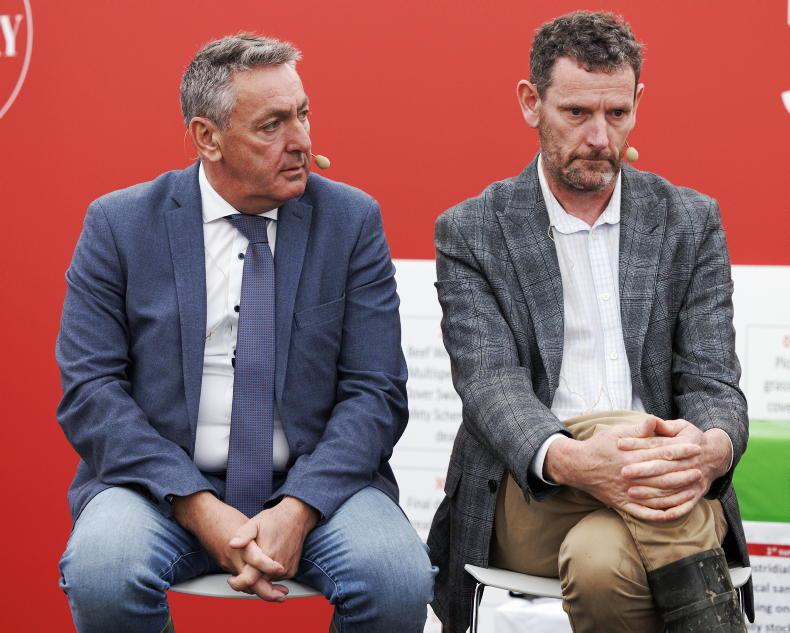
Billy Kelleher and Colm Markey.
\ Donal O' Leary
He faces an uphill battle - he'll probably have to unseat his party colleague Maria Walsh.
While there's an extra seat in the sprawling constituency (along with Laois and Offaly), Fine Gael will hardly hold two seats without the phenomenal vote-grabbing of McGuinness.

Tim Lombard.
Lombard will seek to win a seat back for Fine Gael in Cork South West. That won't be easy, either. Michael Collins is a shoe-in, Holly Cairns is not to be underestimated and Christopher O'Sullivan has quietly carved out a unique place within Fianna Fáil.
No-one could accuse either of them of being quiet on red-button issues. As two dairy farmers, they were most outspoken on the nitrates derogation changes, sounding like members of the opposition rather than Fine Gael's agriculture spokesperson (Lombard) and a Fine Gael member of the European Parliament's agriculture committee.
Will the strategy pay off? Only time will tell.
Billy Kelleher was a little more circumspect in how he separated himself from Charlie McConalogue. A Corkman like Lombard, an MEP like Markey, from a dairy farm like both, but Kelleher is a Fianna Fáil colleague of McConalogue's.
That said, Kelleher has been extremely vocal on farming issues, not least the derogation changes. He and Sean Kelly will be pushing hard to retain their seats in Ireland South in June.
Social climber of the year
Holly Cairns is the first sitting agriculture spokesperson to assume the leadership of a political party with Dail representation in the State’s history.
It’s even more extraordinary when you consider that she made that leap in a left-of-centre party, whose support is mostly urban. But then Cairns has been bucking tends since she scraped on to Cork County Council in 2019.
Standing for the Social Democrats in the Bantry/west Cork region, she prevailed by one vote after a number of recounts.
Little more than six months later, she had taken Fine Gael’s seat in west Cork, the original Michael Collins home constituency.

Holly Cairns. / Donal O'Leary
The scale of that achievement was a little lost in the Sinn Féin tidal wave of the January 2020 election. Since then, she has proven an articulate parliamentarian and able media performer.
While many farmers would put her in the 'woke' bracket, she is well able to argue her point on agricultural policy issues. She might claim her predictions on how the nitrates derogation changes would end have come to pass.
Now, as party leader, her challenge is to ensure the Social Democrats build on their current half-dozen TDs.
With Labour losing a number of their sitting TDs next time out, there is space on the spectrum for a centre-left party. Interestingly, Cairns has chosen to retain her agriculture portfolio as leader.
For all this, Holly Cairns is my politician of 2023.
Spring rising, winterfall
Caroline Van Der Plas catapulted into the national consciousness in March when she led a new and obscure party to first place in the Dutch regional elections. The Farmer Citizen Party (the BBB) gained almost 20% of votes, winning 137 seats on councils across the Netherlands.
They also became the largest party in the Dutch upper house - the senate - in May, as local councillors vote for senators.

Caroline Van Der Plas of BoerBurgerBeweging (BBB). \ Jeroen Meuwsen/BSR Agency/Getty Images)
Ireland was interested partly because she is half-Irish, but also because her party's success was interpreted as a rural - and partly urban - backlash against environmental restrictions on farming, planning and industry.
The Farmers Alliance, which hopes to repeat her success in Ireland, secured her as a guest speaker (online) for its first meeting.
The BBB fared less well in last month's Dutch general elections, finishing in sixth place, with less than 5% of votes, a four-fold drop from just eight months previously.
Van der Plas, a former agri journalist, may still find herself in government as part of a four-way right of centre coalition. Next year's European elections will be another opportunity for her.
A difficult year for Donegal diplomacy
The best news Minister for Agriculture Charlie McConalogue received in 2023 was that Donegal will remain a five-seat constituency for the next general election.
The general feeling was that while McConalogue might be under pressure to retain his seat, he would have a much steeper Mount Errigal to climb if Donegal had reverted to two three-seat constituencies.

Charlie McConalogue being confronted by the IFA's leaders. \ Philip Doyle
That apart, it's been the most challenging year of McConalogue's tenure. As farming suffered from weather-related issues, farmers were angered by climate-related issues.
Nitrates derogation issues dominated the agenda for the latter half of the year, following on from a running battle over rewetting and nature restoration for the first six months.
McConalogue's ratings are currently lower than in 2021, when he had to deliver a complex and divisive CAP reform package.
Payment delays - as the Department struggled to adapt to the new CAP, with its complex network of BISS, CRISS and eco-scheme payments - led to the IFA boycotting the charter steering group.
And to round it all off, the failure to provide more than 4,000 extra places for ACRES leaves agri planners and farmers frustrated and accusing the Government of failing to live up to its rhetoric around environmental enhancement.
Outside health and housing, agriculture may have become the most difficult seat around the cabinet table.
All talk, little delivery
Eamon Ryan is well able to talk a good game. His visit to the ICMSA AGM saw him exchange views with farmers, impressing with his sincerity if not his view of dairy farming's options.
However, we have to measure a minister on what he does, not what he says. And what Eamon Ryan has done is talked about anaerobic digestion, talked about alternative land uses, talked about new income streams for farmers from those land uses. Always optimistic, always preaching about possibilities and potential.

Minister Eamon Ryan at the ICMSA AGM. \ Don Moloney
But we still have no LULUCF target, never mind a plan for achieving that target. We still have no blueprint for how AD pipe dreams will be brought to reality. Moves towards creating carbon trading are farmer-led, not Government-initiated.
It's time for action, Eamon. Or get off the lettuce-growing windowbox, to give a south Dublin twist to a country saying.
Heydon hidden, can Hackett hack it?
Ministers of State have very different portfolios and have had quite different years. Martin Heydon has a much lower profile than his super-junior ministerial colleague Pippa Hackett and that has actually worked in his favour this year.
Heydon has been shielded from the worst of farmer anger by his lower profile. He will be hopeful that this teflon effect can last through until after the next election.
With only three seats up for grabs (Ceann Comhairle Sean O' Fearghail will be automatically returned) he needs all the help he can get.
Meanwhile, Hackett will know her route into the Dail got harder following the separation of Laois-Offaly into two three-seat constituencies.
Having finished sixth in the five-seat constituency last time, her higher profile following her appointment to the Seanad - and from there to cabinet - would have been a cause for cautious optimism.

Ministers of State Pippa Hackett and Martin Heydon flank Minister for Agriculture Charlie McConalogue. \ MAXWELLS
In terms of the year gone by, Hackett can point to the success of the organic scheme she oversees. Two years ago, there were calls for unused organic scheme funds to be diverted to a suckler payment for all farmers. Now, the scheme seems certain to be oversubscribed.
In contrast, forestry remains a bit of a disaster. The problems she has were inherited, but the buck to stops with her to increase planting from current miserably low levels.
Enough to be going on with without getting dragged into calls for bans on all pesticides in the medium future, you might think, but as a conviction politician, she won't shirk from that kind of pronouncement.
It could cost her, and then again, it might pick up urban and younger voters. We'll probably find out later this year.
Yet to blossom
Claire Kerrane TD was appointed Sinn Féin's agriculture spokesperson back in April. It's fair to say that she has yet to really make her mark. While everything she has said and done has been competent and sensible, there has been opportunity for much, much more.
Kerrane is the opposition spokesperson representing by far the largest party on the opposition benches, which sees itself as the government in waiting.

Claire Kerrane, Sinn Fein spokesperson on Agriculture. \ Donal O'Leary
However, she has not been front and centre of the many burning issues that have presented themselves since she took office.
At the National Ploughing Championships, she seemed to play second fiddle to her predecessor Matt Carthy and her party leader Mary Lou McDonald. Due to a family bereavement, she missed the TV opportunity offered by her party's Ard Fheis.
That is likely to change this year. In advance of local, European and probably national elections, Sinn Féin will want to ratchet the pressure up on the Government parties and farming and related rural issues offer opportunities.
At only 31, Kerrane is one of the new generation of Sinn Féin politicians who will be crucial to taking the next steps towards government.
The likely lads
Colm Markey and Tim Lombard face a defining year in their political careers.
Having been catapulted from Louth County Council into the European Parliament following Mairead McGuinness's selection to be Ireland's European Commissioner, Markey will put himself before the electorate in the Midlands, North and West constituency in June.

Billy Kelleher and Colm Markey.
\ Donal O' Leary
He faces an uphill battle - he'll probably have to unseat his party colleague Maria Walsh.
While there's an extra seat in the sprawling constituency (along with Laois and Offaly), Fine Gael will hardly hold two seats without the phenomenal vote-grabbing of McGuinness.

Tim Lombard.
Lombard will seek to win a seat back for Fine Gael in Cork South West. That won't be easy, either. Michael Collins is a shoe-in, Holly Cairns is not to be underestimated and Christopher O'Sullivan has quietly carved out a unique place within Fianna Fáil.
No-one could accuse either of them of being quiet on red-button issues. As two dairy farmers, they were most outspoken on the nitrates derogation changes, sounding like members of the opposition rather than Fine Gael's agriculture spokesperson (Lombard) and a Fine Gael member of the European Parliament's agriculture committee.
Will the strategy pay off? Only time will tell.
Billy Kelleher was a little more circumspect in how he separated himself from Charlie McConalogue. A Corkman like Lombard, an MEP like Markey, from a dairy farm like both, but Kelleher is a Fianna Fáil colleague of McConalogue's.
That said, Kelleher has been extremely vocal on farming issues, not least the derogation changes. He and Sean Kelly will be pushing hard to retain their seats in Ireland South in June.














 This is a subscriber-only article
This is a subscriber-only article








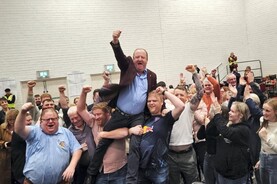
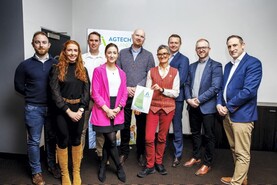
SHARING OPTIONS: